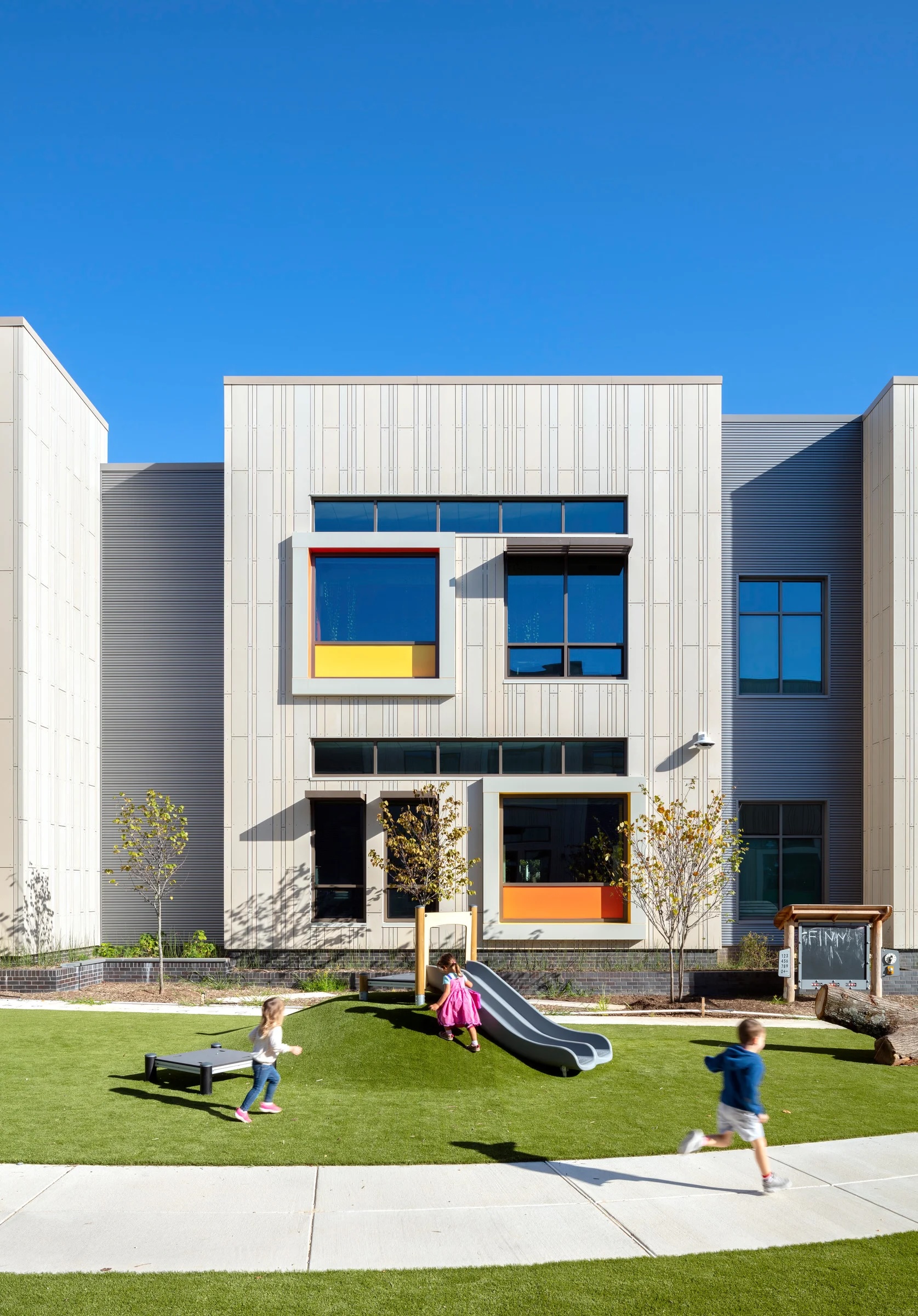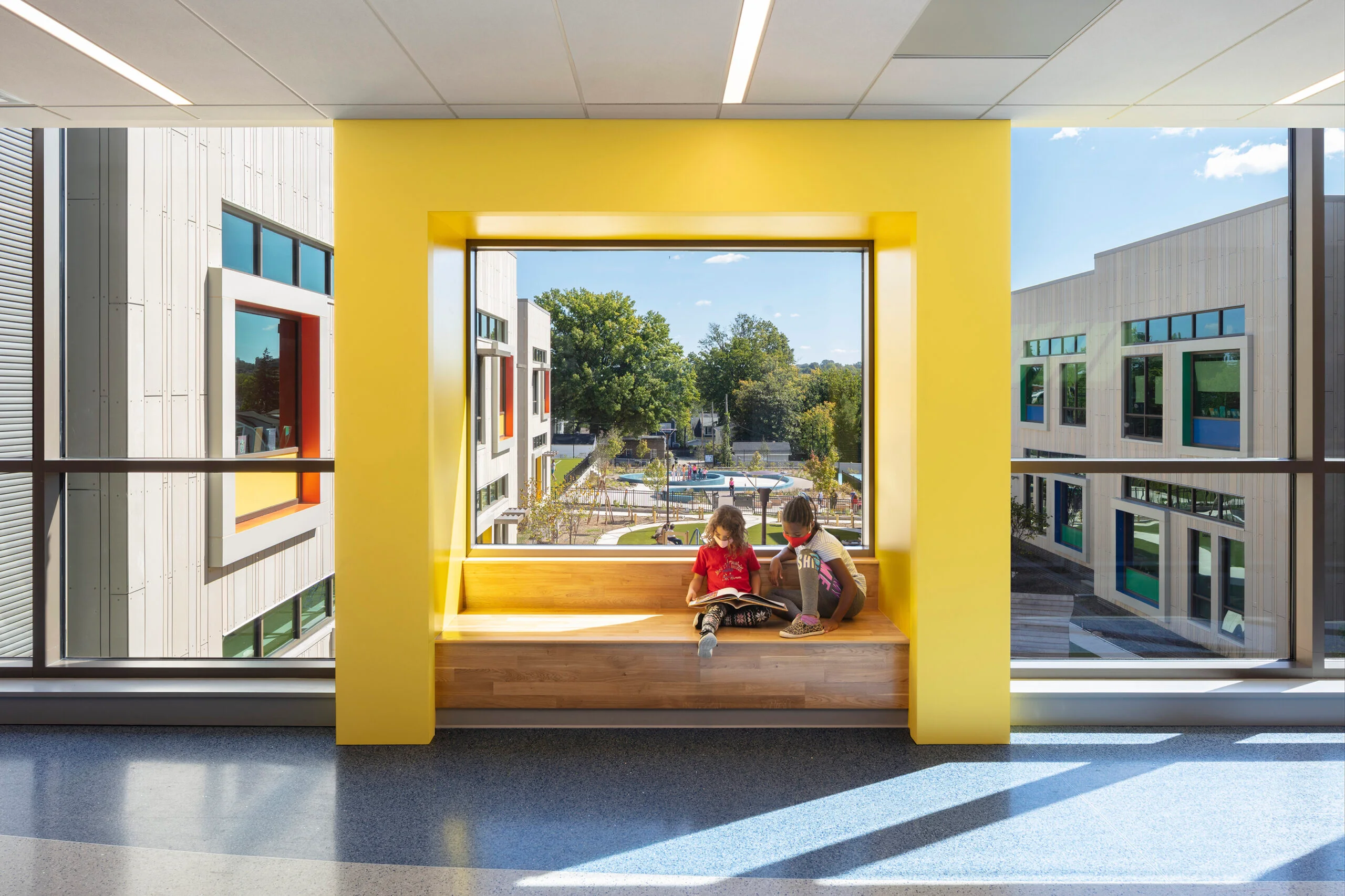A new K-12 school in Washington, D.C., is the first school in the world to achieve both LEED for Schools Platinum and WELL Platinum, according to its architect, Perkins Eastman.
The John Lewis Elementary School is also the first school in the District of Columbia designed to achieve net-zero energy (NZE). The facility was designed to improve student and teacher performance, health, and well-being, as well as reduce the building’s life-cycle costs. (See more K-12 schools coverage from BD+C.)
The new building replaced an obsolete, brutalist open-plan building. The design retained the best aspects of the open plan, providing flexible space and ease of communication, while improving adjacencies, daylighting, acoustics, security, and outdoor space.
The design emphasizes outdoor recreation and connections with the natural world, known to improve student health and academic achievement. The landscape design embeds natural systems with dynamic play and learning spaces to blur the walls of the classroom. A treasured place for the community, certain school amenities are accessible after-hours and on weekends.
The building offers a series of intimate, child-scaled houses inside and outside that foster collaboration and strong relationships. Designers benchmarked performance against several of the highest performing schools in the country on energy and Indoor Environmental Quality (IEQ) factors to provide the best daylight, most comfortable, and healthiest learning environments of any school building.

A high-performance dashboard tracks the building’s energy consumption, showcases the building’s sustainability features, and links to the school’s curriculum to address topics such as social and environmental justice, climate change, and water conservation. Through this interactive, online dashboard, students and teachers can discover how they interact with the building, and how the building and campus influence and are influenced by the larger environment.
The building is paired with Benjamin Banneker Academic High School, concurrently designed, which is also targeting NZE. The excess energy expected to be generated at John Lewis will help Banneker also achieve NZE.
Owner and/or developer: DC Department of General Services | DCPS
Architect: Perkins Eastman DC
MEP engineer: CMTA
Structural engineer: Yun Associates
General contractor/construction manager: MCN Build
Related Stories
| Aug 11, 2010
Gensler, HOK, HDR among the nation's leading reconstruction design firms, according to BD+C's Giants 300 report
A ranking of the Top 100 Reconstruction Design Firms based on Building Design+Construction's 2009 Giants 300 survey. For more Giants 300 rankings, visit http://www.BDCnetwork.com/Giants
| Aug 11, 2010
Gensler among eight teams named finalists in 'classroom of the future' design competition
Eight teams were recognized today as finalists of the 2009 Open Architecture Challenge: Classroom. Finalists submitted designs ranging from an outdoor classroom for children in inner-city Chicago, learning spaces for the children of salt pan workers in India, safe spaces for youth in Bogota, Colombia and a bamboo classroom in the Himalayan mountains.
| Aug 11, 2010
ASHRAE introduces building energy label prototype
Most of us know the fuel efficiency of our cars, but what about our buildings? ASHRAE is working to change that, moving one step closer today to introducing its building energy labeling program with release of a prototype label at its 2009 Annual Conference in Louisville, Ky.
| Aug 11, 2010
10 tips for mitigating influenza in buildings
Adopting simple, common-sense measures and proper maintenance protocols can help mitigate the spread of influenza in buildings. In addition, there are system upgrades that can be performed to further mitigate risks. Trane Commercial Systems offers 10 tips to consider during the cold and flu season.
| Aug 11, 2010
Jacobs, HOK top BD+C's ranking of the 75 largest state/local government design firms
A ranking of the Top 75 State/Local Government Design Firms based on Building Design+Construction's 2009 Giants 300 survey. For more Giants 300 rankings, visit http://www.BDCnetwork.com/Giants
| Aug 11, 2010
Suffolk breaks ground on colorful charter school in Boston
Suffolk Education has broken ground and began renovations and construction of a new $39.6 million facility to house the Boston Renaissance Charter Public School. The Suffolk team is renovating an existing, three-story mill building and warehouse in the Hyde Park section of Boston, Massachusetts, and constructing a 20,000 square-foot addition.
| Aug 11, 2010
PBK, DLR Group among nation's largest K-12 school design firms, according to BD+C's Giants 300 report
A ranking of the Top 75 K-12 School Design Firms based on Building Design+Construction's 2009 Giants 300 survey. For more Giants 300 rankings, visit http://www.BDCnetwork.com/Giants
| Aug 11, 2010
Turner Building Cost Index dips nearly 4% in second quarter 2009
Turner Construction Company announced that the second quarter 2009 Turner Building Cost Index, which measures nonresidential building construction costs in the U.S., has decreased 3.35% from the first quarter 2009 and is 8.92% lower than its peak in the second quarter of 2008. The Turner Building Cost Index number for second quarter 2009 is 837.







